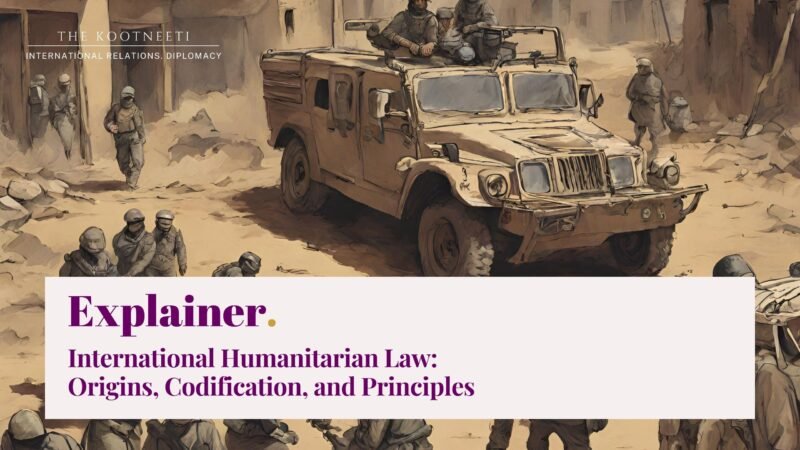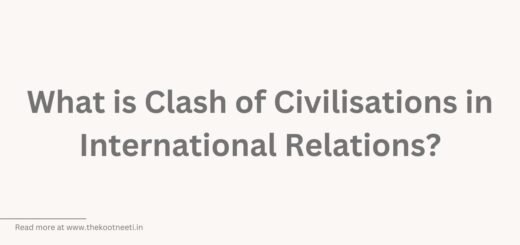[Explainer] International Humanitarian Law: Origins, Codification, and Principles

What is IHL?
International Humanitarian Law or IHL is the special branch of public international law that deals with the laws of war or armed conflict. The objective of these set of rules is to limit the effects of armed conflict and to protect civilians together with those who are not or no longer participants in the hostilities. Additionally, these laws also restrict the means and methods used in warfare which in turn, avoids unnecessary suffering and destruction.
IHL emphasises observance of humanitarian goals in the sense that it authorises and organises relief for people affected by conflict while at the same time, places limits on the use of armed force by military commanders. Therefore, IHL works as a framework for the coexistence of armed and humanitarian actors in situations of conflict.
Earlier, IHL was considered lex specialis or special law which meant that the application of International Human Rights Law would replace general law of human rights or lex generalis. However, this distinction was abolished in favour of the simultaneous application of both branches of the law together with an extraterritorial application of human rights in situations where a state exercises de facto control over a foreign territory or individuals.
It is important to note that while talking about international humanitarian law, it is imperative to remember that it marks a significant departure from the general principles and methods of application of human rights law and interstate international law. This is more so when we consider the principle of reciprocity, non-state armed groups and the notion of interference. IHL confers international status on non-state armed groups involved in international and domestic conflicts. Hence, the application of this body of law does not rest upon States alone but rather on the rights and obligations of all actors involved in the conflict.
Origins of IHL
International Humanitarian Law traces its origins to ancient history when leaders used to set up rules and to maintain control discipline and efficacy. The first laws of war were regional in nature rather than being universal as is the case today. Sun Tzu drafted the first Chinese laws of war in his book Art of War. But these early forms of humanitarian law had a great deal of ambiguity in the sense that they were derived from religious or linguistic perspectives and if the enemy neither spoke the same language nor followed the same religion, these laws would not apply. Efforts were made by such European scholars as Grotius, Vittoria or Vattel to transform moral standards into legal rules.
While this may have been an early effort at codifying humanitarian laws, the efforts intensified during the 19th century propelled mainly by humanitarian initiatives and diplomatic conferences. Henri Dunant, the founder of the International Committee of the Red Cross, having witnessed the ravages of military confrontation and the lack of medical care provided to the victims of the battle of Solferino, played a crucial role in the drafting of the First Geneva Convention in 1864. Four years later in 1868, the Imperial Cabinet of Russia adopted the Saint Petersburg Declaration which prohibited the use of certain kinds of weapons.
The Declaration asserted that the state should only seek to weaken the enemy military forces and no other useless means that worsen the plight of the disabled people should be deemed legitimate.
World War 1 proved to be a major test for the balance between humanitarian and military necessities and ultimately in 1926, ICRC called for a revision of the provisions. This led to the drafting of an additional convention on the treatment of the Prisoners of War. Soon thereafter the Second World War led to a reordering of the world and naturally called for further revisions of IHL. The end of this war led to the coming of the UN and a more ambitious phase of recodifying human rights law got underway. The four Geneva Conventions are the result of this recodification.
Codification and Provisions
The most important resource when it comes to the codification of IHL is the Geneva Conventions of 1949 which has the most wide-ranging mandate in the sense that it is ratified by most of the states. The first three of the Geneva Conventions set the rules for the international treatment of combatants who may either be wounded, shipwrecked or prisoners of war. The Fourth Geneva Convention contains provisions for the protection of civilians protection in national as well as international conflicts. Moreover, two Additional Protocols were adopted in 1977: the first was “Relating to the Protection of Victims of International Armed Conflicts and the second was “Relating to the Protection of Victims of Non-International Armed Conflicts”. Additionally, many conventions and declarations of the Hague are also sources of IHL.
Apart from these formal codifications, there are some customary principles which have wide acceptance primarily because of the duration for which they have been observed and the consistency with which it has been done. These customary principles also constitute IHL.
Principles
There are two primary principles of IHL: the Principle of Humanity and the Principle of Necessity.
The first principle essentially specifies that all humans have the capacity and respect for all. This does not mean, however, that death, destruction and harm are unlawful during the conflict. What this means is that there needs to be a limit to harm and destruction and all actions must be governed by the principle of humanity.
On the other hand, the principle of military necessity underlines the fact that no action should be carried out in the event of a conflict that is not militarily essential. In other words, where attack and damage is not absolutely essential for military purposes, should not be carried out.
Some other principles include the distinction between civilians and combatants which is aimed at minimising non-combatant casualties; the distinction between civilian and military objects; and necessity and prohibition of unnecessary suffering.


















